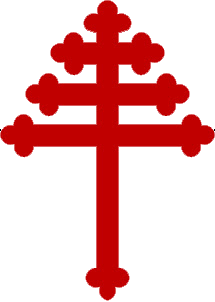Emar Qayso إمر قيسو
ܐܶܡ̣ܰܪ ܩܰܝܣܳܐ ܕܠܺܝ ܘܳܝܠܺܝ ܘܡܽܘܢ ܓܰܕܫ̣ܰܢܝ
قالَ الصليبُ: الويلُ لي، ماذا حدَثَ لي The cross said: Woe to me, what has happened to me La croix a dit : Malheur à moi, qu’est-ce qui m’est arrivé Emar Qayso: Waili, maza hadatha liܕܰܥܠܰܝ ܨܰܠܒ̣ܽܘܗ̱ܝ ܠܗܰܘ̇ ܡܳܪܳܐ ܕܒܶܪ̈ܝܳܬܳܐ
حتّى صلَبُوا عليَّ سيّدَ البرايا Until they crucified upon me the Lord of creatures Jusqu’à ce qu’ils m’aient crucifié, le Seigneur des créatures Da’lay salbuhi lahu Mar’a d’briyathaܕܰܒܡܶܛܪܳܐ ܘܰܒܛܰܐܠܳܐ ܪܰܒ̣ܝܰܢܝ
لقد ربَّاني بالمطَرِ والندَى He nurtured me with rain and dew Il m’a nourri avec la pluie et la rosée Dabmetra wabtala rabiyaniܘܰܗ̇ܘܺܝܬ ܠܶܗ ܦܳܪܽܘܥܳܐ ܒܺܝܫܳܐ
فجازَيْتُه سوءًا So, I rewarded him with evil Donc, je l’ai récompensé par le mal Wahwit laih faru’a bishaܠܺܝ ܛܽܘܒܰܝ ܕܰܛܥܶܢ̣ܬܶܗ
لكن الطوبى لي إذ حمَلْتُهُ But blessed be me for I bore him Mais béni soit moi, car je l’ai porté Laih tubai data’netehܘܳܝܳܐ ܛܳܒ ܠܨܳܠܽܘ̈ܒܰܘܗ̱ܝ
الويلُ الويلُ لصالبِيه Woe, woe to his crucifiers Malheur, malheur à ceux qui l’ont crucifié Waia tob lsalbuhiܩ̣ܳܡ ܒܶܝܬ ܕܺܝܢܳܐ ܗܰܘ̇ ܡܳܪܳܐ ܕܒܶܪ̈ܝܳܬܳܐ
قامَ ربُّ البرايا للمحاكمة The Lord of creatures stood for judgment Le Seigneur des créatures s’est levé pour le jugement Qam bet d’dyana haw Mar’a d’briyathaܘܰܐܝܟ ܚܰܝܳܒܳܐ ܐܶܫ̣ܬܰܐܰܠ ܕܳܐܶܢ ܟܽܠ
ديَّانُ الجميعِ استُنطِقَ كالمُذنب The judge of all was questioned as a sinner Le juge de tous a été interrogé comme un pécheur Weikh hayaba ishtal da’en kulܕܽܘܡܳܪܰܐ ܗ̱ܘ̣ ܕܝܳ݀ܬܶܒ ܩܽܘܠܳܥܳܐ
عجَبٌ أنّ الترابيَّ جالسٌ It is a wonder that the earthly one sits C’est une merveille que l’être de terre soit assis Dumara hu d’yatheb qola’aܥܰܠ ܒܺܐܡܰܐ ܘܰܠܡܳܪܶܗ ܕܳ݀ܐܶܢ
على المنبرِ ويحكمُ على سيّدِه Upon the pulpit and judges his Lord Sur la chaire et juge son Seigneur ’Al bima walmarih da’enܕܰܥ̣ ܢܰܦܫܳܟ ܥܰܘܳܠܳܐ
إِعرِفْ نفسَكَ أيّها الأثيم Recognize yourself, O sinful one Reconnais-toi, ô être pécheur Da’ nafshakh ‘awalaܘܙܽܘ̣ܥ ܡܶܢܶܗ ܕܕܰܝܳܢܰܐ ܗ̱ܘ̣
وارتعِدْ منه فهو الديَّان And tremble before him, for he is the judge Et tremble devant lui, car c’est le juge Wzoo’ meneh d’dayana huܬܳܝ̣ ܟܺܐܢܽܘܬܳܐ ܩܽܘ̣ܡܝ ܘܰܚ̣ܙܳܝ ܒܶܝܬ ܕܺܝܢܳܐ
تعالَ أيّها العدلُ قُمْ وانظُرْ إلى المحاكمة Come, O justice, rise and look upon the trial Viens, ô justice, lève-toi et regarde le procès Tay kenu’ta qumi wakhzay bet d’dyanaܠܡܽܘܢ ܘܡܶܛܽܘܠ ܡܽܘܢ ܡܶ݀ܨܛܰܥܰܪ ܝܰܩܺܝܪܳܐ
لمَ ولأجلِ مَن يُهانُ الوقور Why and for whom is the dignified one dishonored Pourquoi et pour qui l’honorable est-il déshonoré L’mun wemtul mun mesta’ar yaqiraܥܰܠ ܕܰܥܒ̣ܰܕ ܚܰܡܪܳܐ ܡܶܢ ܡܰܝ̈ܳܐ
أَلأنّه حوَّلَ الماء إلى خمر؟! Is it because he turned water into wine?! Est-ce parce qu’il a transformé l’eau en vin ?! ’Al d’abd khamra men mayaܥܰܠ ܕܰܐܢܗ̣ܰܪ ܠܣܰܡܝܳܐ ܚܶܫܽܘܟܳܐ
أَلأنّه أنارَ على ظلمةِ الأعمى؟! Is it because he illuminated the darkness of the blind?! Est-ce parce qu’il a illuminé l’obscurité de l’aveugle ?! ’Al d’anhara l’samya heshukhaܐܰܘ ܕܰܠܡܳܐ ܥܰܠ ܕܰܐܣ̣ܺܝ
أَم تُراهُم لأنّه طبَّبَ Or is it because he healed Ou est-ce parce qu’il a guéri ’Aw dalma ‘al d’asyܟܪ̈ܺܝܗܰܝܗܽܘܢ ܣܳ݀ܢܶܝܢ ܠܶܗ
مرضاهُم يبغضُونَهُ their sick, they hate him leurs malades, ils le haïssent Kriyhayhun saniyn leh